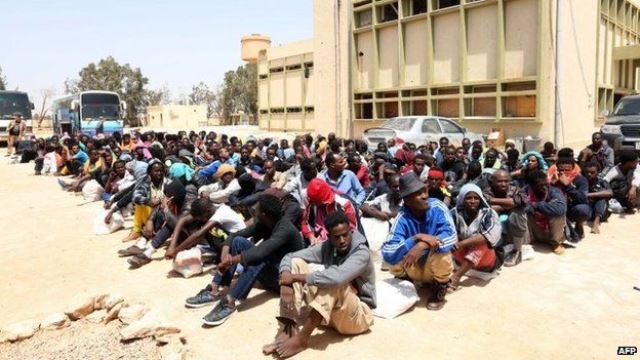Members of Wellbeing Economy Africa Network (WE-Africa) rose from their meeting held in Pretoria, South Africa, November 27 to 29, 2017 with a strong call to put an end to modern day enslavement of migrants and refugees in Libya and for the prosecution of those complicit in the dehumanising acts for crimes against humanity.

WE-Africa is an action-research alliance of likeminded scholars and practitioners who share a common concern about the current socio-economic conditions in which we live and are willing to work together to promote a transition to a wellbeing-based economy for Africa. WE-Africa works to consolidate evidence for change while focusing on building a new economy and promoting alternative development policies.
WE-Africa recognises that the abominable events in Libya are a culmination of a number of factors, none of which, however, excuses the inhuman acts. Such factors include the fact that most African nations are riddled with conflicts and dependent on wasteful economic policies that do not meet the basic needs of their citizens. Some of these refugees were thus seeking an escape from poverty, war, unemployment and environmental destruction. They had already endured the hazards of passing through the hostile Sahara Desert before being held in Libya, with Europe turning a blind eye to such gross human rights violations. Their journeys into slavery began as migrants as well as economic, political and climate refugees hoping to make their ways to the Mediterranean coasts of Libya and crossing over to Europe.
WE-Africa says it recognises that facilitating the downfall of regimes through external military intervention without creating the necessary conditions for a democratic transition has created a fertile condition for serious humanitarian disasters and human rights abuses. An example, it adds, is the military intervention in Libya by NATO, which has contributed to the present situation, adding to centuries of colonialism and decades of neo-colonialism that have led to ecological mayhem and rising inequality in Africa.
Against the backdrop of the Euro-Africa summit taking place in Abidjan (Cote d’Ivoire), WE-Africa calls on the European Union to recall its complicity in what is happening in Libya and not to forget their long-standing relations with Africa, including historical, ecological and climate debts, and ease access to their territory as this would eliminate the power of illicit cartels trading in human misery.
WE-Africa regrets that, at a time when economies of African nations are said to be “growing”, the social and economic realities of citizens remain abysmal.
In a declration, WE-Africa called on the African Union and African governments to:
- Request the United Nations Human Rights Commission to conduct a detailed investigation and bring those who are accountable for this terrible and inhuman act to justice.
- Go beyond demanding for a probe of the subhuman treatment being meted to Africans by other Africans on our continent and take an immediate diplomatic and political actions to stop these inhuman acts.
- To carry out investigations on why their citizens prefer to embark on the hazardous journey to Libya rather than remain in their home countries.
- Urgently put in place pro-people measures that ensures full employment, security, access to health, education and other social needs.
- Urgently recognise and utilise the rich human resources and gifts of Nature in the continent to derive alternatives pathways to wellbeing, including increased human development indices.
- Question the use of indices such as Gross Domestic Product (GDP) that give false notions of growth while citizens groan under the weight of unjust and inequitable economic relations.
- Embrace a difference approach to development inspired by the concept of “Wellbeing Economy” to build the pathway to an egalitarian future and entrenched in the spirit of Ubuntu.
“We cannot be silent. African governments cannot be silent. Time to act is now!” declared the group.
